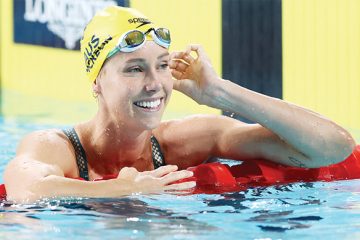Oscar Pistorius has no legs; yet he is an Olympic sprinter. He should be an angry young man, instead he possesses a lovely sense of humour. He should wear a frown, but a bright smile lights up his face whenever he answers a question; even difficult ones. In a competition where game changers are lauded, Pistorius should be celebrated above all else. Yet human nature dictates that we speculate, question and put under a microscope anyone who is different. In life, like in school, the easiest way to live is to fit in.
Pistorius certainly does. Looking at his lean frame dressed in tracks and a jacket, it would be impossible to state that this is a man who has no legs below his knees. Pistorius himself states that he never felt different. Even though he is. Pistorius was born without a fibula in either of his legs and his parents yielded to doctors’ recommendations that his lower legs should be amputated. When he was 11 months old they were cut off just below the knee. At 13 months he was fitted with prostheses. At 17 months, he was walking. Now he is among the top-ranked 400-meter runners in the world.
“My mother never allowed it [to feel different]. She always said — your brother puts shoes on in the morning and you put on your legs. And that is the last I will hear of it,” recalled a smiling Pistorius yesterday. “I never really felt different. I was always playing with my brother and sister and my family was always crazy about sports. I wasn’t academic at all; sports was always my thing.”
Indeed it was, and Pistorius only got into athletics after a fledgling interest in rugby was arrested by a horrible knee injury in 2003. But he has also actively pursued wrestling, water polo, rugby and motocross. “I have stopped going on the motorbikes too much. They are too risky,” says Pistorius cheekily. He was referring to an accident on his bike a few years ago when he clipped a fence and turned around to see one of his prosthetic legs swinging from a section of barbed wire.
In fact, accidents seem to be part and parcel of the Pistorius story. A boating one in 2008 was particularly galling. His face and body hit the steering wheel, and he broke two ribs, his jaw and an eye socket. Doctors had to sew 172 stitches in his face.
Those excesses hint at the simmering rage behind his cool exterior. It is perhaps this that drives Pistorius. The South African, it seems, is blessed with an unenviable temperament; a fierce, even frenzied need to take on the world at maximum speed and with minimum caution. He has the heart of an athlete.
Which is why it makes sense that Pistorius is the first man to achieve the unthinkable feat of running in the Olympic Games without lower limbs.
Pistorius is scheduled to run in the 4×400 metre relay for South Africa in these Games. Usain Bolt, the world-record holder in both the 100 and 200 metres does the same for Jamaica. There is the real possibility that Bolt and Pistorius could square off against one another in the finals of that event. For many it may provide the marquee moment of London 2012 — Usain Bolt against the Blade Runner.
Pistorius laughs at his nickname. “It’s not something I would have preferred, but I don’t really mind it either,” he says with a twinkle in his eye. He is similarly pragmatic when answering questions about how many believe his prosthetics give him an unfair advantage.
“If I lived by life according to what five percent of the world believed I should do, I would never have been here in the first place,” says Pistorius.
“I have made myself available for testing by some of the best scientists in the world, and it has been singularly proved that my prostheses do not give me an advantage,” says Pistorius.
Indeed an initial IAAF ruling banning Pistorius from able-bodied competition in January 2008 was later reverted after appeal to the CAS (Court of Arbitration for Sport) who rejected the IAAF claim.
Even sprinting legend Michael Johnson went on record saying that he believed Pistorius could have an advantage. But the South African holds no grudges.
“I have deep respect for Michael Johnson and we have often spoken. I think his fear is what technology could do, as opposed to whether it gives me an advantage. As for the IAAF, I now have an excellent relationship with them,” says Pistorius.
The idea of Pistorius gaining an advantage is tantalising but also rubbish really. This is a man who does not have legs. What kind of a disadvantage does that put him in to start with? Think of it in this context. Lionel Messi was a promising player in Argentina. But he was always small. When he moved to Barcelona at the age of 13, the club paid for his treatment to address a growth-hormone deficiency. Perhaps, without those enhancements Messi might just have ended up another average football player?
So does Pistorius’s legs give him an advantage? “If they do, then why aren’t every other Paralympic runner wearing them clock the speeds I do?” he challenges. The truth is that like all elite athletes Pistorius possess the drive, ambition and the sheer single-mindedness that is necessary to be successful.
As he himself says it best.
“Any advantage I have comes from years of hard work and sacrifice. All the confidence that I have in the starting blocks comes from knowing that I have done the right thing, day in and day out.”
Oscar Pistorius truly is an example of indomitable spirit.
-With The Daily Star input





